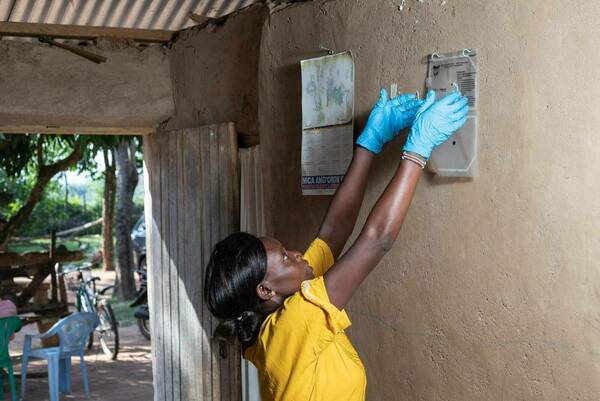Notre Dame’s R.I.S.E. AI Conference builds interdisciplinary collaboration to inform human-centered artificial intelligence
As artificial intelligence (AI) transforms nearly every sector of society — from healthcare and education to governance and global development — a critical question emerges: How can we conscientiously design and deploy these powerful technologies to positively impact society?
This question lies at the heart of the R.I.S.E. AI Conference in early October, hosted by the University of Notre Dame’s Lucy Family Institute for Data & Society. The Conference will welcome more than 330 participants from over 16 countries, 55 companies, and 38 universities to the Notre Dame campus to explore AI’s societal impact grounded in the principles of Responsibility, Inclusion, Safety, and Ethics (R.I.S.E.).

Inspired by the University’s longstanding commitment to advancing common good, the conference offers an interdisciplinary approach to AI with a clear lens on societal impact, featuring breakout sessions, panels, workshops, and six research tracks to reflect the diverse landscape of AI, not only along R.I.S.E. AI dimensions but also representative of several of the University-wide initiatives within the 2033 Strategic Framework of the University. The research tracks will feature cutting-edge innovations in R.I.S.E. AI presented by global researchers who were selected from a pool of over 170 abstracts submitted during the spring of 2025.
“The Lucy Family Institute for Data & Society is committed to translating data and AI innovations into impactful solutions for society’s greatest challenges,” said Nitesh Chawla, the Frank M. Freimann Professor of Computer Science and Engineering and the Lucy Family Director for Data and AI Academic Strategy, leading the Data, AI and Computing Initiative. “The R.I.S.E. AI Conference serves as a catalyst for this mission — placing human-centered innovation and societal impact at the core of AI, while bridging academia and industry to advance responsible innovation and applications across sectors,” Chawla added.
The R.I.S.E. AI Conference features a lineup of globally recognized speakers from academia, industry, and nonprofit organizations. Keynote addresses will be presented by Father Paolo Benanti, TOR (Luiss Guido Carli University); Arnab Chakraborty and Dayle Stevens (Co-CEOs of the Accenture – Telstra Data & AI Joint Venture); Xin “Luna” Dong (Meta); Stacy Garrett-Ray, M.D. (Ascension); Juan Gilbert, Ph.D. (University of Florida); Michelle Hermiston, M.D. (VinUniversity); Robyn Kress (Ascension Foundation); Ketan Paranjape, Ph.D. (Optum); Michael Pencina, M.D. (Duke Health); Sriram Raghavan (IBM Research); and Aarti Singh, Ph.D. (Carnegie Mellon University).
Unique sessions and panel discussions will include an exploration of AI’s impact in Latin America, the role of AI in artistic expression and how University of Notre Dame alumni are developing and leveraging AI in their professional roles.

Within the Conference, the Health AI Forum, which has evolved from the Lucy Family Institute’s Health Equity Data forums, invites a diverse group of healthcare stakeholders to tackle challenges of health access and outcomes at the intersection of health research, data science, and AI. Centered on rural health, the keynote speeches, research poster presentations, panel and roundtable discussions will consider emerging AI technologies that may enhance health transparency, optimize access to care, and increase continuity of care for aging individuals with mental health challenges.
“Data and AI offer transformative potential for understanding and improving healthcare, particularly in rural settings where access to facilities can be limited and healthcare workforce shortages persist,” said Fang Liu, Notre Dame Collegiate Professor and Associate Chair in the Department of Applied and Computational Mathematics and Statistics, and director of the Health Data Exploration and Analytics Lab at the Lucy Family Institute. “Through the Health AI Forum, we are creating a space where real problems meet rigorous research — actively promoting dialogue between practitioners and researchers and enabling new models and methods to take shape with direct relevance to rural communities.”
Other Conference activities include a series of poster sessions from faculty and student researchers representing over 38 universities, and several networking receptions. Poster presenters also have the opportunity to receive Societal Impact awards for collaboration, global impact or transformative change through data science and AI research. These awards will be announced at the R.I.S.E. AI Conference closing dinner.
“My hope is that the R.I.S.E. AI Conference becomes a catalyst — not just for advancing AI research, but to position the University of Notre Dame as a leader in ensuring that AI is developed with responsibility, inclusion, safety, and ethics at its core,” said Chawla, who is also the founding director of the Lucy Family Institute for Data & Society. “Together, we can chart a future where AI truly serves the common good.”
For more information about the R.I.S.E. AI Conference, please visit lucyinstitute.nd.edu/rise-ai.
Contact:
Christine Grashorn, Program Director, Engagement and Strategic Storytelling
Lucy Family Institute for Data & Society / University of Notre Dame
cgrashor@nd.edu / 574.631.4856
lucyinstitute.nd.edu / @lucy_institute
About the Lucy Family Institute for Data & Society
Guided by Notre Dame’s Mission, the Lucy Family Institute adventurously collaborates on advancing data-driven and artificial intelligence (AI) convergence research, translational solutions, and education to ethically address society’s vexing problems. As an innovative nexus of academia, industry, and the public, the Institute also fosters data science and AI access to strengthen diverse and inclusive capacity building within communities.
Latest Research
- Fighting for maternal healthThe United States has the highest maternal mortality rate of developed nations. An innovative postpartum care model from Notre Dame can save mothers around the globe. Read the story Originally…
- NSF Cyber SMART’s fall meeting shapes fifth year of project, legacy and future plans, and adds new memberThe U.S. National Science Foundation (NSF) Cyber SMART center gathered for its fall meeting on the University of Notre Dame campus this September. The meeting served as a checkpoint with progress reports and new projects from research leads and students…
- Slavic and Eurasian studies professor wins Humboldt fellowship to research how Russia’s religious past shapes its presentWhen Russia invaded Ukraine on Feb. 24, 2022, Sean Griffin realized his second book needed a new title. Griffin, an associate professor in the University of Notre Dame’s Department of…
- University of Notre Dame joins the Global Coalition of Ukrainian StudiesThe University of Notre Dame has joined the Global Coalition of Ukrainian Studies after signing a Memorandum of Cooperation (MOC), formalized on September 24, 2025, at the Ukrainian Institute of America in New York City. Notre Dame joined four other American…
- The University of Notre Dame’s Mendoza College of Business and Industry Labs team up to inspire national security manufacturing competitiveness in the regionThe South Bend - Elkhart Region is full of manufacturing companies that are poised to grow, and Executive Master of Business Administration (EMBA) and Master of Business Administration (MBA) students at the University of Notre Dame are finding innovative ways to contribute to that growth. Earlier…
- Notre Dame research informs WHO conditional recommendation for spatial repellents in malaria vector controlThe World Health Organization (WHO) recently announced a “conditional recommendation” for spatial emanators, also known as “spatial repellents,” in the fight against malaria. This key determination was informed by spatial repellent studies that included the Advancing Evidence for the Global Implementation of Spatial Repellents (AEGIS) Project in Kenya, led by the University of Notre Dame and funded by Unitaid. The findings from this particular study were recently published in The Lancet.













